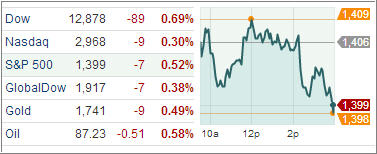Equity ETFs edged lower as rhetoric over progress on budget negotiations by Senate Majority Leader Harry Reid triggered a late sell off that eclipsed better than expected Economic data and an alleged European deal on Greece aid.
Investors mostly shrugged off strong reports on the US economy and positive developments in Europe. The S&P/Case-Shiller 20 city index gained for the sixth straight month in September, signaling the US housing market is in the midst of recovery.
Demand for durable goods remained flat in October, a Commerce Department report showed, defying expectations for a 0.7 percent decline. New orders for US non-defense capital goods excluding aircraft climbed 1.7 percent last month, the most in five months.
Separately, a Conference Board report revealed consumer confidence rose to the highest level in more than four years in November.
Equity indexes spent most of the day bouncing around the breakeven line after European finance ministers meeting in Brussels cut interest rates on Greece’s bailout loans, suspended interest payments for a decade, gave Athens more time to repay and agreed for the country to buy back its own bonds.
The market’s decline however, came after Nevada Senator Harry Reid said little progress has been made in talks to avert billions in automatic spending cuts and tax hikes set to come into effect in January.
The Dow Jones Industrial Average (DJIA) slipped 89 points with 23 of its 30 components finishing in the negative territory.
The S&P 500 Index (SPX) trimmed 7 points with utilities pacing the gains and energy and financials sliding the most as nine of its 10 sectors slipped into red.
US Treasuries rose for the second day as investors grew concerned whether the Congress can address the fiscal cliff swiftly and adequately, spiking demand for safer assets. Yield on the benchmark 10-year Treasury notes fell two basis points to 1.64 percent while 30-year Treasury bond yield fell one basis point to 2.79 percent.
The dollar advanced on Tuesday as enthusiasm over better-than-expected economic reports was tempered by the uncertainty of the looming fiscal cliff.
European stock markets, however, inched up with the Stoxx Europe 600 index climbing 0.3 percent to close at 272.86 after investors welcomed news from Brussels that the troika of the EC, the ECB and the IMF has agreed on measures to bring Greece’s debt down to sustainable levels.
Risk sensitive sectors like banks rallied across Europe on Tuesday. Deutsche Bank AG jumped 1.7 percent while Commerzbank AG rose 1.93 percent in Frankfurt, lifting the DAX 30 index 0.6 percent.
The CAC 40 index closed slightly higher in Paris after oil group Total SA sank 1.2 percent, offsetting gains in Societe Generale SA and Credit Agricole SA.
Shares of Lloyds Banking Group Plc jumped 2.9 percent, lifting the FTSE 100 index higher 0.22 percent in London.
In the ETF space, agricultural commodities mostly advanced following today’s economic reports. The Barclays iPath DJ-UBS Grains Total Return Sub-Index ETN (JJG) climbed 2.06 percent after reports suggested lack of rains have left the winter wheat harvest in the worst condition in over 25 years. Both the Teucrium Corn Fund (CORN) and the Teucrium Soybean Fund (SOYB) also advanced on the day, adding 1.58 percent and 1.28 percent, respectively.
Our Trend Tracking Indexes (TTIs) pulled back slightly with the Domstic TTI retreating to +1.46%, while the International TTI remained deeper in bullish terriotory by +3.62%.
The fiscal cliff issue with its hardened battle fronts can wreak havoc with the markets unless a satisfying solution is found. In my view, nothing will get resolved until the very last minute with pressure exerted possibly by a retreating stock market, which to me is the only way politicians can be forced to arrive at a mutually agreeable compromise.
Disclsure: No holdings in ETFs discussed above
For quick access to the most recent StatSheet including TTI charts and all momentum figures, click here. You can read the latest ETF Model Portfolio update here.
Contact Ulli

